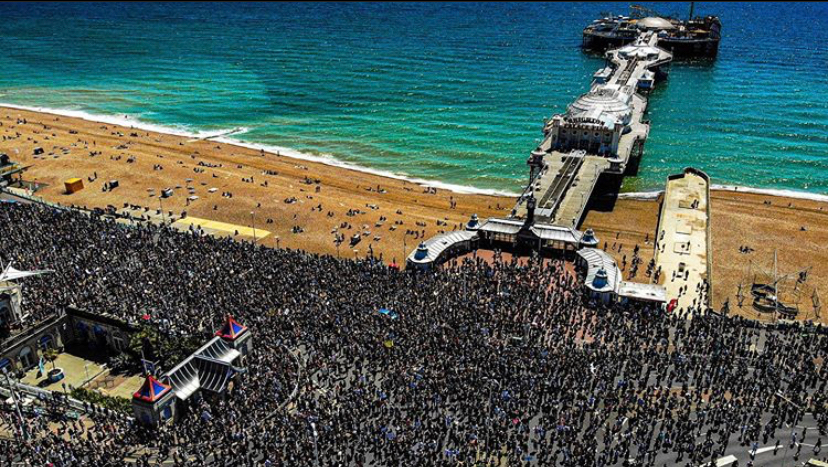Breaking the silence @ BLM Brighton
By Elisey Sergevnin
Elisey (eh-lee-say) is a student of Russian and Nigerian origin, currently living in Brighton, England. Below they are depicting the struggles of navigating this biracial identity, the racism surrounding and their relationship to the Black Lives Matter movement.
The Black Lives Matter Brighton march took place on the 13th of June 2020, a sunny Saturday of what had been a stormy week. The town was roaming with thousands and thousands of attendees, with the socially distant, silent protest that took place before the march stretching out for about 2.5 miles. Witnessing such a large turn out show up supporting an anti-racist cause made me remarkably hopeful for the future, considering Brighton’s history of racism and lack of inclusion and diversity.
Growing up in Moscow, as a child of a white Russian mother and a black Nigerian father, was confusing, to say the least. Unlike America and the UK, Russia does not have a centuries-long history of anti-blackness, thus the concept of race within the Russian community and the vocabulary surrounding it is very limited but also widely misunderstood. With a population of over 144 million people, only 1% are Black.1 In effect, this causes a lot of identity issues for Black Russians alike since there is minimal representation.
Photo by Elisey (@thatelisey)
Then, after moving to England at the age of 14 to attend high school, I was hoping to reverse the effects of my white Russian environment and gain a deeper understanding of my identity. With my English improving dramatically, I was able to access educational resources on race, which allowed me to engage in the discourse surrounding it. However, once again, I couldn’t help but feel trapped and limited. Living in a predominately white, middle-class boarding school, I often found myself unable to freely discuss not only my own experiences of racism and oppression but also about the broader global implications. Any attempts of using my voice to raise awareness about racial injustices present within the school structure, Britain or the world, were often dismissed and invalidated. This veil of ‘colour-blindness’ eventually made me shut down, and shut up, leading me to become less consistent in my activism.
For these reasons, attending the Brighton protest was not even a question for me. It seemed that finally, white and non-black people were willing to not only recognize the stark realities of anti-black oppression but also dismantle it. Black voices were finally being listened to, and I thought it was imperative to use mine, after so many years of feeling silenced. Yet, I find it incredibly unsettling that it took this long and the murder of yet another innocent Black man. I remember writing about police brutality and the Black Lives Matter movement for my school’s magazine in 2016, and unfortunately, these issues have only gotten worse. I felt that it was my responsibility to attend the protest and use my voice and privilege as a bi-racial person to not only show solidarity to our American brothers and sisters, but to all Black people because racism and anti-blackness are global issues. Thatis what I want people to remember. Unfortunately, George Floyd, Breonna Taylor, and Oluwatoyin Salau are not isolated incidents but are victims of systemic racism that has existed for centuries.
Photo by: @varum.mahatme
1 Hernandez, V., Sadeghzadeh, C. and Prosvirova, O., 2018. Being Black In Russia. [online] BBC News. Available at: <https://www.bbc.co.uk/news/av/world-europe-44253936/world-cup-2018-being-black-in-russia>


